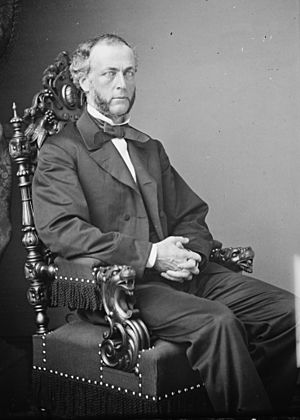Frederick A. Conkling facts for kids
Quick facts for kids
Frederick A. Conkling
|
|
|---|---|

Conkling between 1855 and 1865
|
|
| Member of the U.S. House of Representatives from New York's 6th district |
|
| In office March 4, 1861 – March 3, 1863 |
|
| Preceded by | John Cochrane |
| Succeeded by | Elijah Ward |
| Member of the New York State Assembly from the 7th District |
|
| In office January 1, 1859 – December 31, 1860 |
|
| Preceded by | David J. Chatfield |
| Succeeded by | Daniel Young |
| Member of the New York State Assembly from the 13th District |
|
| In office January 1, 1854 – December 31, 1854 |
|
| Preceded by | William Taylor |
| Succeeded by | Richard M. Blatchford |
| Personal details | |
| Born |
Frederick Augustus Conkling
August 22, 1816 Canajoharie, New York, U.S. |
| Died | September 18, 1891 (aged 75) New York City, New York, U.S. |
| Political party | Republican, Liberal Republican, Democrat |
| Spouses |
Eleanora Lorillard Ronalds
( |
| Parents | Alfred Conkling Eliza Cockburn |
| Relatives | Roscoe Conkling (brother) |
| Education | The Albany Academy |
| Profession | Politician, banker, executive, and writer |
Frederick Augustus Conkling (August 22, 1816 – September 18, 1891) was an important American politician from New York. He served in the United States House of Representatives during the American Civil War. After the war, he also worked as a banker, an insurance company executive, and a writer.
Contents
Early Life and Family
Frederick Conkling was born in Canajoharie, Montgomery County, New York. He was one of five children. His father, Alfred Conkling, was also a U.S. Congressman.
Frederick had a younger brother named Roscoe Conkling, who became a U.S. Representative and later a Senator. Frederick studied classic subjects and attended The Albany Academy.
Political Career
Frederick Conkling started his career in business in New York City. He was part of a dry goods company called Conkling & Churchill.
He was elected as a Republican to the New York State Assembly. This is a group of elected officials who make laws for New York State. He served in this role in 1854, 1859, and 1860.
Serving in Congress
In 1860, Frederick Conkling was elected to the Thirty-seventh United States Congress. This was the same election year that Abraham Lincoln became president. Conkling served in Congress from March 4, 1861, to March 3, 1863.
During his time in Congress, he was the Chairman of the United States House Committee on Ways and Means. This committee is very important because it deals with taxes and other money-related laws for the country. He tried to be re-elected in 1862 but was not successful.
Role in the Civil War
When the American Civil War began in June 1861, Frederick Conkling helped organize a group of soldiers called the 84th Regiment of New York Volunteers. He became their Colonel (a high-ranking officer).
His regiment went to the front lines early in the war. They served in the Shenandoah Valley Campaign. In 1863, his regiment was on duty in Baltimore, Maryland, acting as a provost guard, which means they helped keep order.
Later Political Efforts
After leaving Congress, Conkling ran for mayor of New York City in 1868 as a Republican, but he lost. After this, he changed his political party. He first joined the Liberal Republican Party and then became a Democrat. He even turned down a chance to run for Congress again in 1874 as a Democrat.
Business and Writing
Frederick Conkling was one of the people who helped start the West Side Savings Bank in New York City. He was the president of this bank for many years. Later, he became the president of the Aetna Fire Insurance Co. in Hartford, Connecticut, until it closed in 1880.
He also wrote many pamphlets. These were small books or brochures about different topics like politics, business, and science.
Personal Life
Frederick Conkling was married to Eleanora Lorillard Ronalds (1825–1879). Her family was very well-known; her grandfather, Pierre Lorillard II, was the head of the Lorillard Tobacco Company.
Frederick and Eleanora had three children:
- Alfred Ronalds Conkling (1850–1917), who became an alderman (a local politician) in New York City and an author.
- Howard Conkling (1855–1938), who was a famous lawyer.
- Helena Conkling.
Frederick Conkling passed away at his home in New York City on September 18, 1891, after being sick for over two years. He was buried in Green-Wood Cemetery in Brooklyn.
 | Stephanie Wilson |
 | Charles Bolden |
 | Ronald McNair |
 | Frederick D. Gregory |

